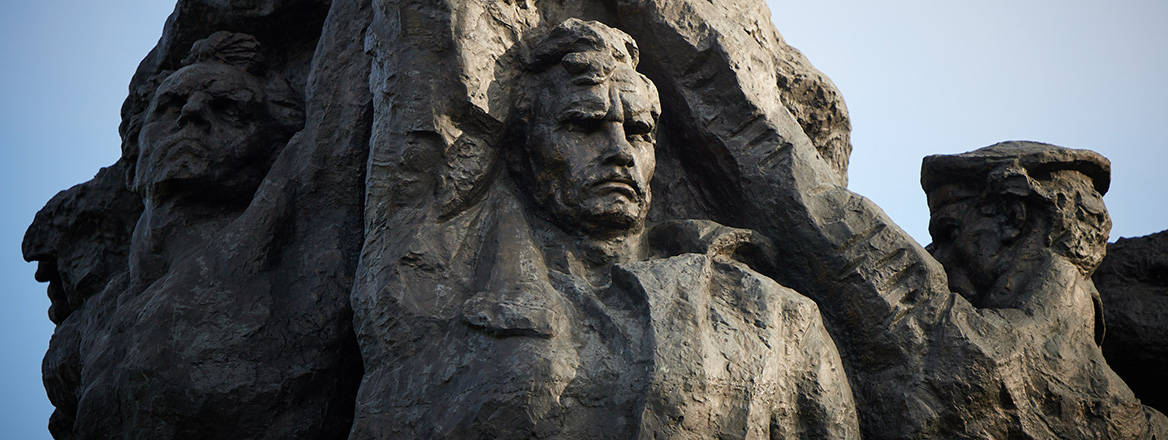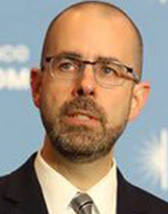Calling Genocide by its Name: Atrocity Prevention in Foreign Policy
President Joe Biden’s willingness to label atrocities committed in Ukraine and elsewhere as genocides is becoming a significant part of his foreign policy and serves as a potent demonstration of solidarity with victims.
When speaking before a crowd in Iowa in April, President Joe Biden declared that Russia's war in Ukraine constituted ‘genocide’. The president later explained he understood the significance of such a powerful word. ‘It's become clearer and clearer that Putin is just trying to wipe out the idea of even being a Ukrainian’. Far from a misstatement, genocide terminology is becoming a clear trend in his foreign policy. Biden has named more genocides than any of his predecessors, and he's not even halfway through his first term.
In the days that followed his Iowa statement, administration officials explained a process would follow to make a formal determination. Genocide is a legal term developed by Professor Rafael Lemkin, a Pole who lost dozens of family members to the Holocaust. Lemkin created the word by fusing geno-, from the Greek word for race, with -cide, stemming from the Latin word for killing. From this eventually followed the UN Convention on the Prevention and Punishment of the Crime of Genocide, which defines the term as any ‘acts committed with intent to destroy, in whole or in part, a national, ethnic, racial or religious group’ through killing, serious bodily harm, and other means.
For those listening to Biden's views on the Ukraine conflict, his use of the word ‘genocide’ is not surprising. For instance, Biden has referred to Vladimir Putin as a ‘war criminal’ and called him a ‘butcher’ when meeting with Ukrainian refugees in Poland. And his recent statement about genocide was not a one-off.
In March, the Biden administration concluded that Burma's military, the Tatmadaw, had committed genocide against Rohingya Muslims. Until that moment, no administration had found the courage to make this determination. Secretary of State Antony Blinken used the powerful platform of the US Holocaust Memorial Museum to announce the decision, explaining how ‘members of the Burmese military committed genocide and crimes against humanity against Rohingya’.
In another first, last April, Biden addressed the longstanding genocide claim regarding Armenians. Historians have documented the Ottoman Empire's eight-year campaign of mass murder against Armenians, as well as Assyrians and Greeks, starting on 24 April 1915. Scholars estimate that 1.5 million Armenians died. As a candidate, Biden pledged to recognise the Armenian genocide, and he did so as president on 24 April 2021. He untangled a Gordian knot of competing interests by identifying the perpetrators as officers of the defunct Ottoman Empire, while maintaining working relations with Turkey's President Erdogan. The long-suffering Armenian community widely praised the announcement.
Identifying atrocities in the most potent way demonstrates to victims that their plight is not forgotten
In fact, a willingness to identify genocides began at the start of his administration regarding China. On the last day of the Trump administration, then-Secretary of State Mike Pompeo announced a finding that the Chinese government was perpetrating genocide against Uighur Muslims in Xinjiang. While human rights activists welcomed the decision, the timing surprised many, with some concluding that Pompeo hoped to create a political problem for the incoming administration.
Yet when Blinken testified at his confirmation hearing for Secretary of State days later, he agreed with the finding and noted his family's connection with the Holocaust. Soon after, in March 2021, Blinken announced that the Biden administration had drawn the same conclusion when releasing the State Department's Human Rights Report for China.
While many wondered what role human rights would play in the Biden administration's foreign policy, combatting atrocity crimes ranks high. These declarations assert US leadership and moral authority. Identifying atrocities in the most potent way demonstrates to victims that their plight is not forgotten. Ukrainian President Volodymyr Zelensky, Burmese activists, the Armenian diaspora, and Uighur Muslims feel heard by Biden’s pronouncements.
Critics and sceptics insist that such announcements must follow a lengthy review process with State Department lawyers. Certainly, policymakers must carefully consider such decisions, but having experienced these processes, officials should consider other options. I say this having worked through the determination process about whether Islamic State atrocities against Yazidis, Christian, and others constituted genocide when serving in the Obama and Trump administrations. As has been documented, the process was plodding, bureaucratic and unresponsive to the exigencies of the moment – the definition of paralysis by analysis. The process only moved forward when the political leadership took interest and created urgency within the bureaucracy.
Other critics view genocide statements as a purely political exercise. As stated in a report to Congress by the Prevention and Protection Working Group, ‘The means by which the US Government publicly calls out atrocity crimes, whether they be genocide, crimes against humanity, war crimes, or other gross human rights violations, is unacceptably politicized’. But it is not only the US. French President Emmanuel Macron was critical of Biden's use of the ‘G’ word relating to Ukraine. ‘I am prudent with terms today’, because ‘genocide has a meaning’, he said. True, indeed. But while referencing legal standards, he also politically aligned and justified his reasoning. ‘The Ukrainian people and Russian people are brotherly people ... I'm not sure if the escalation of words serves our cause’. For Macron, then, it was less about the totality of the facts and more about not wanting to limit options with Putin.
Rightly identifying genocides when they occur is a significant action, serving as a guiding star for US foreign policy
Identifying instances of genocide quickly and honestly would better serve rights-respecting countries and victims, instead of playing political or bureaucratic games. Of course, we shouldn't rush the process, but the review should be standardised, timely and insulated from politics. Regardless of where or when atrocities occur, dispassionately reviewing facts builds credibility and avoids politicisation. To delay or postpone until a more convenient time only creates future headaches, emboldening perpetrators while leaving victims adrift.
And when announcing determinations, follow-up is crucial to ensure that these words matter. Repeated usage of the word ‘genocide’ without consequences will undermine the term. To ensure ‘never again’ doesn't happen again, and to maintain credibility, consequential diplomacy must reinforce statements – for instance, by sanctioning government officials implicated in the crimes.
The US cannot – and should not – do it alone. Coordinating with like-minded countries can create a web of reinforcing penalties to ensure lasting impact and secondary effects on businesses and family members. The upcoming London ministerial on religious freedom provides a readymade platform for the administration to further build international support for beleaguered communities in Afghanistan, Burma and China, as well as genocide survivors in Iraq and elsewhere.
Genocide is the ‘crime of crimes’. Words are powerful, and I applaud Biden for addressing these issues frankly. Rightly identifying genocides when they occur is a significant action, serving as a guiding star for US foreign policy. It is becoming a distinct part of Biden's foreign policy agenda.
The views expressed in this Commentary are the author’s, and do not represent those of RUSI or any other institution.
Have an idea for a Commentary you’d like to write for us? Send a short pitch to commentaries@rusi.org and we’ll get back to you if it fits into our research interests. Full guidelines for contributors can be found here.
WRITTEN BY
Knox Thames
- Jim McLeanMedia Relations Manager+44 (0)7917 373 069JimMc@rusi.org


